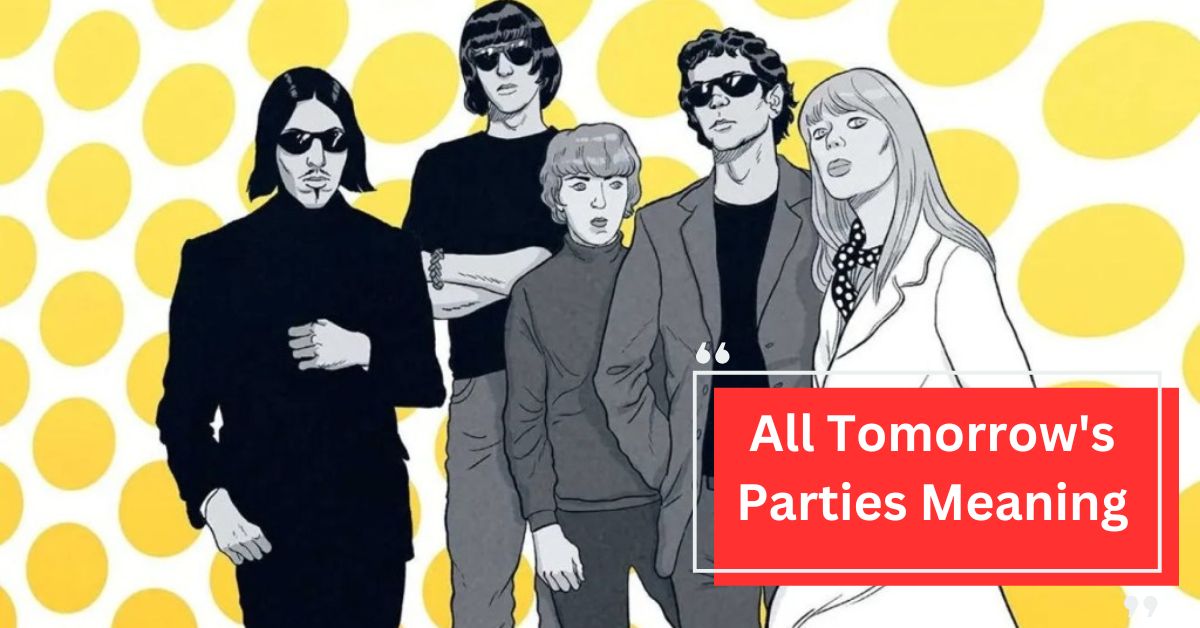All Tomorrow’s Parties Meaning – An In-Depth Look!
All Tomorrow’s Parties by The Velvet Underground reminds me of college, where I constantly changed to fit in at parties. The haunting lyrics and Nico’s voice captured my feelings of emptiness and taught me to be true to myself.
All Tomorrow’s Parties Meaning by The Velvet Underground explores the emptiness of trying to fit in by constantly changing oneself. The song’s haunting lyrics and Nico’s voice capture the superficiality of social expectations and the search for genuine self.
We’ll look at what All Tomorrow’s Parties by The Velvet Underground means. The song’s haunting lyrics and Nico’s unique voice show the emptiness of trying to fit in and how it reflects the pressures of social expectations and the search for being true to oneself.
What Is The Main Theme Of All Tomorrow’s Parties?
The central theme of All Tomorrow’s Parties revolves around the artificiality and emptiness inherent in social events and the pursuit of status. The song critiques the superficial nature of high society and the constant cycle of social gatherings that offer little genuine connection.
By contrasting the opulence of elite parties with the alienation experienced by those on the fringes, the song highlights the profound disconnection between appearance and reality. It underscores how people often engage in a facade of social perfection while feeling emotionally unfulfilled. This theme is reflected in the repetitive and haunting nature of the lyrics, which emphasize the monotony and lack of substance in these social rituals.
Who Wrote All Tomorrow’s Parties And Which Band Performed It?

All Tomorrow’s Parties was written by Lou Reed, the primary songwriter of The Velvet Underground. The song was performed by the band, which was known for its avant-garde approach to rock music. The Velvet Underground, formed in the mid-1960s, was a groundbreaking group that pushed the boundaries of traditional music with its experimental sound and provocative lyrics.
The band’s debut album, “The Velvet Underground & Nico,” features this track and includes contributions from German singer Nico, who provided the distinctive and haunting vocals that are central to the song’s unique atmosphere. The collaboration with Nico, who was introduced to the band by Andy Warhol, added a layer of depth and intrigue to the song’s presentation.
Read:Painsltube – The Ultimate Guide!
When Was All Tomorrow’s Parties Released?
All Tomorrow’s Parties was released in 1967 as part of The Velvet Underground’s debut album, “The Velvet Underground & Nico.” This album was notable for its innovative sound and lyrical content, which were ahead of their time.
The release of this album marked a significant departure from the mainstream music of the era, characterized by its raw and unfiltered approach. The Velvet Underground’s work was initially met with limited commercial success but has since been recognized as highly influential in shaping the future of alternative and experimental music genres.
Why Does All Tomorrow’s Parties Feature Such Haunting Lyrics?

Repetition and Melancholy:
The song uses repeated, melancholic lyrics to highlight the monotony of social gatherings. The repeated question about costumes shows the endless cycle of trying to fit in and maintain appearances.
Disconnection and Reflection:
The haunting lyrics evoke a sense of disconnection and encourage listeners to reflect on their own experiences with social expectations. The mood of the song highlights feelings of being out of place.
Cyclical Social Events:
The refrain about choosing costumes symbolizes the repetitive nature of social events and the pressure to conform. It underscores how these gatherings can feel repetitive and superficial.
Pursuit of Status:
The lyrics point out the emptiness that comes with trying to achieve social status. The focus on appearances shows the lack of real substance in social interactions.
Melancholic Mood:
The haunting lyrics match the song’s sad mood, enhancing the themes of alienation and superficiality. This alignment deepens the emotional impact of the song.
How Does Nico’s Voice Contribute To The Meaning Of All Tomorrow’s Parties?

Nico’s voice is a critical element in conveying the song’s emotional and thematic depth. Her deep, ethereal tone and detached delivery add a layer of haunting melancholy to the track. Nico’s vocal style is characterized by its somber and almost impersonal quality, which complements the song’s themes of alienation and superficiality.
Her voice creates a sense of distance and introspection, enhancing the feeling of detachment from the social scene described in the lyrics. This unique vocal delivery helps to convey the emotional weight of the song and reinforces the sense of emptiness and disconnection experienced by the characters in the song.
What Societal Issues Does All Tomorrow’s Parties Address?
Class Disparity:
The song contrasts the wealthy and the poor, showing the big gap between rich and marginalized people. This highlights social inequality and the different experiences of each class.
Superficial Social Interactions:
It critiques how social events focus more on appearances and material wealth rather than real connections. The emphasis on costumes for parties shows the trivial nature of these gatherings.
Societal Expectations and Conformity:
The song examines the pressure to conform to social norms, symbolized by choosing the right costume. It reflects how this pressure can make people lose their individuality.
Emptiness from Pursuing Social Status:
The song points out the emptiness that comes from chasing social status and approval. It shows how focusing on appearances and fitting in can lead to personal dissatisfaction.
Critique of Materialism:
By contrasting rich and poor lives, the song criticizes how society values material wealth and status over genuine personal connections and well-being.
How Does The Song Reflect The Experience Of Trying To Fit In?
The song captures the experience of trying to fit in by depicting the constant need to adapt and present oneself according to societal expectations. The repeated question about choosing a costume for the parties symbolizes the pressure to conform to social norms and maintain a certain image.
This constant adaptation reflects the struggle of individuals to align with societal expectations while feeling a sense of disconnection and dissatisfaction. The song portrays how the pursuit of acceptance and the need to fit in can lead to a sense of alienation and the erosion of one’s authentic self.
What Emotions Does All Tomorrow’s Parties Evoke In Listeners?
All Tomorrow’s Parties evokes a range of emotions, including melancholy, introspection, and a sense of alienation. The haunting melody, combined with Nico’s somber vocals, creates an atmosphere of reflective sadness.
Listeners may feel a sense of empathy for the characters depicted in the song, as well as a recognition of their own experiences with social superficiality and personal disconnection. The song’s exploration of the emptiness of social expectations prompts listeners to reflect on their own lives and the authenticity of their social interactions.
Why Is All Tomorrow’s Parties Considered A Timeless Piece Of Music?

All Tomorrow’s Parties is considered timeless due to its innovative musical approach and its enduring exploration of universal themes. The song’s unique blend of haunting lyrics, experimental instrumentation, and Nico’s distinctive voice set it apart from contemporary music of its time.
Its themes of social superficiality and the search for authenticity remain relevant across different generations, making it a powerful and enduring piece. The song’s influence on later music and its continued relevance in discussions of social expectations contribute to its status as a classic and significant work in the history of popular music.
How Does All Tomorrow’s Parties Capture The Essence Of Social Expectations?
All Tomorrow’s Parties captures the essence of social expectations by highlighting the superficial nature of societal interactions and the pressure to conform. The song’s focus on costumes and parties illustrates the emphasis placed on outward appearances and the importance of maintaining a certain image.
Through its lyrics and repetitive structure, the song critiques the way social norms often overshadow genuine personal experiences and emotions.
By exposing the emptiness behind these social rituals, All Tomorrow’s Parties offers a poignant commentary on the challenges of navigating a world where appearance and acceptance frequently take precedence over authenticity and self-fulfillment.
Read:Nikyuseko.Com – A Digital Odyssey!
FAQ’s:
1. What is the story of All Tomorrow’s Parties?
All Tomorrow’s Parties examines the emptiness and superficiality of social events. The song contrasts the lives of wealthy individuals with those of the less fortunate, showing how social gatherings often emphasize appearances rather than meaningful connections.
2. What are parties called now?
Nowadays, parties are often referred to as gatherings, events, socials, or functions. The name depends on the event’s nature and purpose.
3. What are 5 types of parties?
Common types of parties include birthday parties, dinner parties, cocktail parties, themed parties, and house parties. Each type serves a different purpose and has its own style.
4. What are the 3 different types of parties?
There are three main types of parties: political parties, which are groups focused on elections and government influence; social parties, which are gatherings for enjoyment; and legal parties, which involve individuals or groups in legal matters or agreements.
Conclusion:
All Tomorrow’s Parties examines class differences, shallow social scenes, and the pressure to fit in. Its haunting lyrics show the emptiness of chasing status and material wealth. The song offers a lasting look at staying true to yourself in a world focused on appearances.
Read more:







